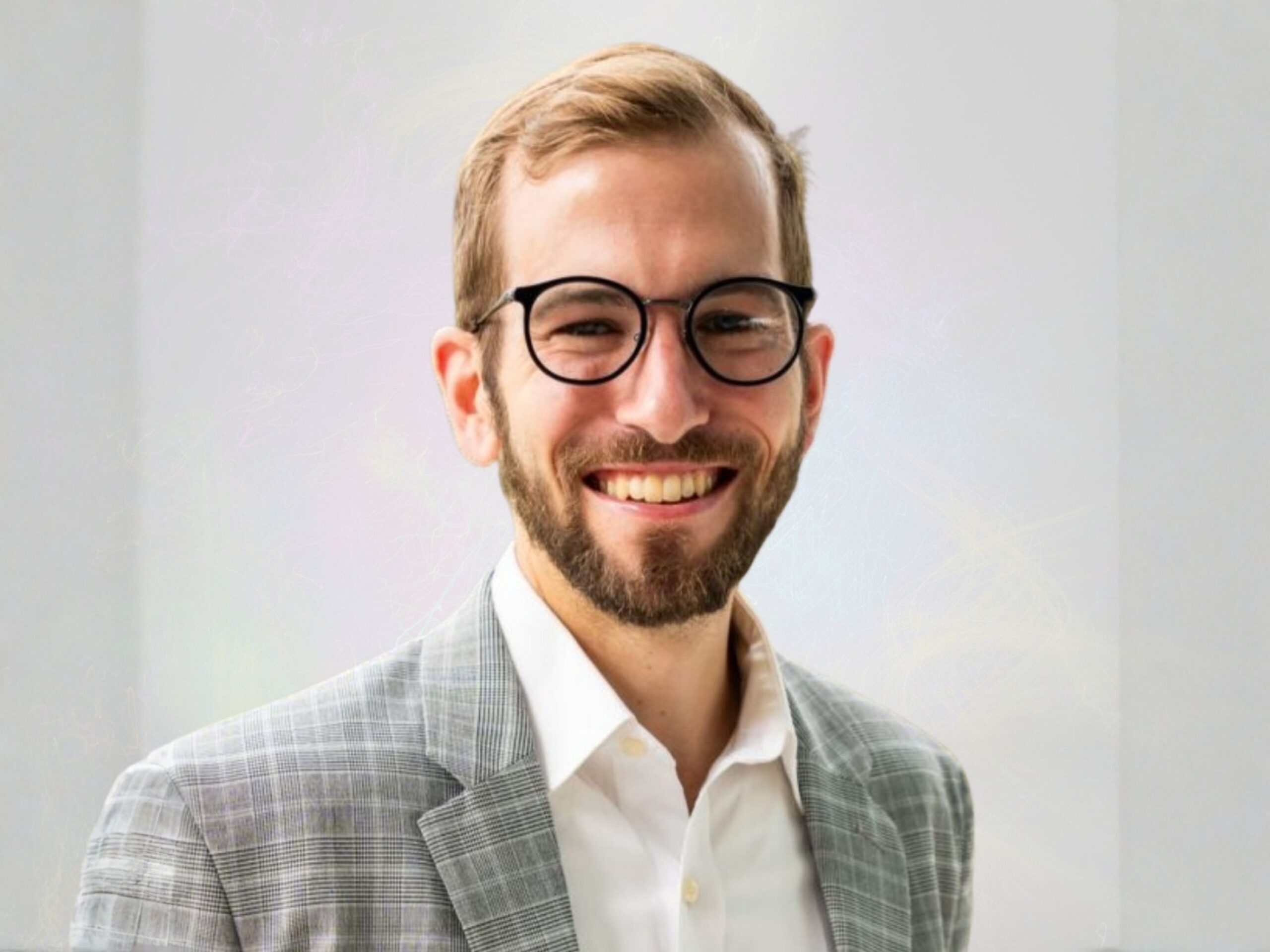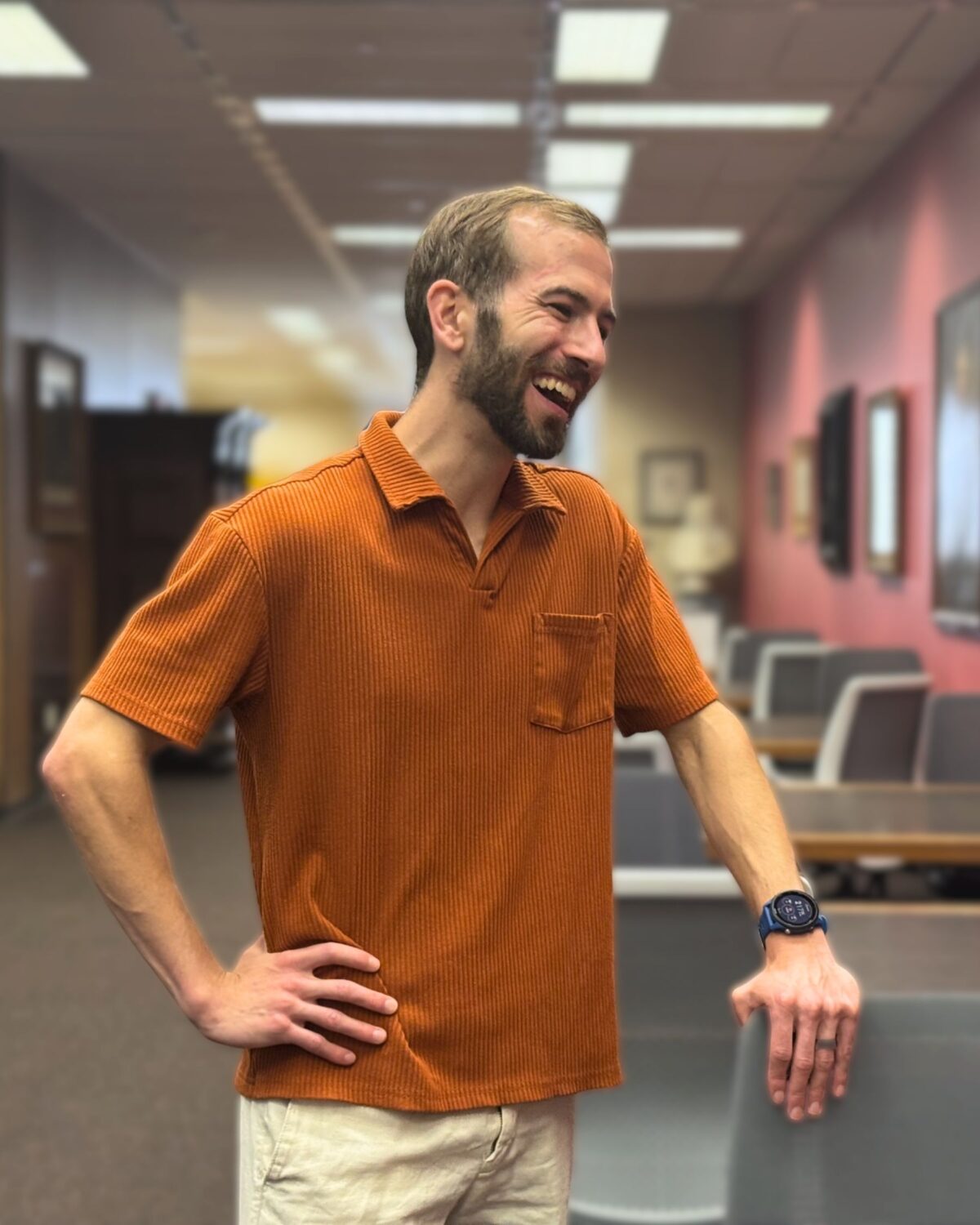
Kevin Frazier arrived in Austin this summer and quickly discovered the new home he and his wife had purchased would require significant work on its foundation. It was a fitting reminder of the reason he came to the capital city in the first place.
“We’re creating something new and transformative in this space,” says Frazier of his roles as Texas Law’s first AI Innovation & Law Fellow and the inaugural director of the school’s AI Innovation & Law Program. “To start something from scratch, you need an appetite for risk and a strong stomach for the challenges that can show up—like a big home repair!”
The house got fixed and he and his wife, Dalton, a member of the fundraising team at a major nonprofit, are loving Austin. “We’re swimming at Barton Springs, eating breakfast tacos, drinking way too much coffee, and getting out and about with our dog, Wilie,” Frazier says. “You can literally and figuratively say we’ve settled down very quickly.”
Meanwhile, the program Frazier and Dean Bobby Chesney have launched is taking off like a rocket, with weekly events, a cohort of student fellows, and a first-of-its-kind AI Opportunity Inventory, an online database tracking the most promising uses of emerging AI technologies to tackle societal problems large and small.
The use of the word “opportunity” was chosen purposefully to emphasize how Frazier approached the landscape of artificial intelligence policy work. “We’re celebrating technological progress,” he says. “This program is emphatically not fear-based.”
We’re celebrating technological progress. This program is emphatically not fear-based.”
Kevin Frazier
Two months into the new school year, we sat down with Frazier to learn why he’s is excited to be at Texas Law, what this new program is up to, and what it offers to students that no other program anywhere else can.
A lot of law schools are launching AI programs. What’s different about this one?
We’re celebrating technological progress. That’s simple but profound, and it orients our mission, programming, and curriculum. We really want to empower our students to shape the future by harnessing AI in a way that aligns with the rule of law and human flourishing. Other schools seem to be focused on augmenting existing systems with AI—and, frankly, are more focused on constraining the technology rather than driving innovation that serves our individual interests and collective well-being.
How does this approach manifest itself?
We’re continuously asking ourselves three questions to guide our work: What skills are most valuable and necessary for lawyers in an AI-forward world; how can public and private institutions incorporate AI to fulfill their missions more effectively and efficiently; and how can governance encourage AI development and diffusion.
It’s a huge advantage that we’re in Austin. The future arrives earlier here! That means students have unrivaled access to people and companies actively driving AI innovation. That provides our students with regular opportunities to test new AI tools, learn from leading practitioners, and contribute to the ongoing governance conversations. We already have student fellows—I like to call them our “AI Wranglers”—working on a range of substantive projects that allow them to gain relevant experience for the law jobs of the future.
We also have a podcast, “Scaling Laws.” Few professors podcast, and even fewer podcast exclusively about AI advances and related policy debates. The show allows us to stay on the vanguard of AI developments and to expand the network of stakeholders with an interest in Texas Law’s AI program.
With all the (understandable) anxiety around AI, how are incorporating the optimism inherent in your approach?
We’ve been here before. Every wave of new technology—from the Ford Model T to the Apple I personal computer—introduces challenges and opportunities. And time and time again, society finds ways to benefit from those developments. Adjusting to the social costs of AI may be painful but there are smart ways to mitigate those costs without getting in the way of a technology that can save lives, spread knowledge, and advance science. I’m incredibly excited to be involved in conversations on that topic. I’m even more excited to make sure our students are involved in those discussions, too. We’re building a program where our students are surrounded by others who do not fear the future but welcome the challenge of making sure that the future is as bright as possible for as many people as possible. This all goes back to our core belief that the future belongs to those who help build it—that’s exactly what we’re doing here.
Tell us what concrete things the program offers now, in year one, and what’s coming?
The fellows are already working with the Austin AI community to survey startups about AI policy and what actions the Texas Legislature can take to lead in AI innovation. We’ve also launched an AI Opportunity Inventory, a repository of the incredible AI use cases that are already helping society solve important problems like speeding up drug development and improving education for students who learn differently. Our partners on the Opportunity Inventory include AI thought-leaders from Brown University, U.C. Berkeley, and the Aspen Institute, among other places. And the podcast is really empowering more Americans—including our students—to contribute to AI policy conversations by discussing the technology and regulation in accessible terms. Of course, there are exciting things happening in the classroom. Just one example: our spring course will pair students with AI labs, venture capitalists, and nonprofits to critically analyze some of the most important outstanding legal questions in the AI space.

Students must love this.
Candidly, one reason this works so well here is that our focus matches perfectly with the Texas Law community ethos and mindset. Texas Law students are optimistic about the future and eager to contribute to the most important conversations in our society. It’s no exaggeration to say that the direction of AI development is the single most important issue in the world right now. It’s no surprise that my students show up early and stay late. They’re all in on this.
How did you find yourself in this world?
I’ve been blessed to have had amazing opportunities in the tech space, both in the private sector and in government service. I’ve seen the incredible potential of emerging technologies and the importance of empowering policymakers to oversee the thoughtful adoption of those innovations. I’ve had roles with Google, Cloudflare, Verily, and Personalis, so I’m no stranger to the fact that technology is a driver of human flourishing—these companies are building tools can save us time, preserve our mental energy, improve our health, and, as a result, free us up to pursue more meaningful tasks. And I’ve spent time with the state governments of Oregon and Montana, and in roles within the federal government, so I’m sympathetic to public servants working hard to look out for the public in this chaotic and complex technology era. That’s why I started thinking of myself as a translator: someone who appreciates the goals and aspirations of both actors and who has just enough knowledge of both fields to help get them on the same page.
I’ve pursued that work through several channels, including podcasts, popular writing, law review articles, and so on. I’m incredibly excited that Dean Bobby Chesney has made a bet that, working together, we can scale up those efforts in a major way here in Austin.
So, the next thing to do is make sure the world, especially prospective students, knows what you’re doing here.
I’m tremendously gratified by how students have embraced this and I am enjoying working with the dean and the admissions team to spread the word. Nothing anywhere else calling itself an AI program will provide the opportunities offered by Texas Law’s AI Innovation and Law Program: to contribute to substantive conversations about AI policy; to sit at the same table as venture capitalists; to partner with AI thought-leaders on an ambitious initiative such as our Opportunity database; and to network with national leaders in government and business through the “Scaling Laws” podcast.
And to do it all in one of the world’s best cities and technology hubs, at a Tier 1 research university, less than a mile from the state capitol of a global leader in innovation and investment.
I’m also confident that no other program will clear a path for you to pick your own AI adventure. Our faculty is full of professors with a keen interest in AI as it applies to their fields. Their doors are open so that students can propose bold areas of study. Our staff is leaning into new AI tools. They won’t question why you’re using AI but will instead help you think about how to use it in a responsible, productive fashion. If you want to build something, start something, or spark something, this is the place.
